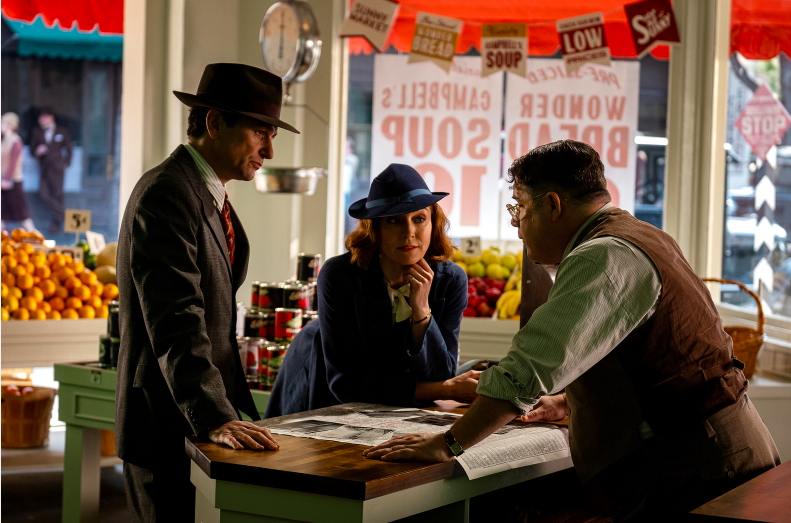Compared to the first season of HBO’s “Perry Mason,” led by Matthew Rhys as the titular detective-turned-attorney, the premiere of the second season was pretty tame. Last season, Mason tracked down a child-killer who stitched his victim’s eyes open. When he’s back in court this time, it’s because a pair of grocers is feuding.
Sunny Gryce (played by Sean Astin) is a kind of walking caricature of a blustering “by the bootstraps” early 20th century capitalist; he is represented by Mason and is suing his former employee, Ed Purtell (Matt Bush) for opening his own grocery store across the street. Based on Ed’s testimony, it sounds like he put in most of the organizational work at Sunny’s. He wrote the manager’s handbook, he came up with the slogan and he perfected the layout of the store. Why not apply that hustle to your own business?
But according to Sunny, Ed’s store is essentially a copy of his, which Mason goes on to demonstrate in court.
“You know what I love, Ed? Quaker Crackels Cereal,” Mason said, holding up a cereal box. “I mostly eat ’em right out of the box, like popcorn. I’ve . . . I’ve even taken this to the movie theater. Where would I find that in your store?”
“Aisle six,” Ed said — same as Sunny’s.
The same is true for the Underwood Deviled Ham (aisle 12) and the Bromo (aisle 2). That’s three for three, Mason pointed out, “a batting average Lou Gehrig would be jealous of.” It’s clear that Mason doesn’t exactly feel great about the work he is doing for Sunny, especially after Sunny asks him to turn up the legal heat on Ed, even after the defense has offered to settle. This, in turn, brings one of the premiere’s main points of tension further into the spotlight: What does real justice actually look like? And, importantly for our protagonist, how do you help someone achieve it?
Without spoiling too much of the first episode, it’s unclear how exactly the competition between Ed and Sunny will contribute to the plot of the overall season (the episode did end with a murder, after all). However, what is clear is that Sunny isn’t one who is eager to back down. After receiving a visit from Mason about the terms of the settlement, Sunny offers this cartoonishly pugilistic line: “Were you in the war, Mason? Then you and I both know, firsthand, mercy is not something people can afford when they are in a war.”
Dramatic? Undoubtedly — but then again, so was the real-life world of grocery stores at that point in history.
“Perry Mason” is set in Depression-era Los Angeles. The 1920s was a period of acute materialism. As Bob Batchelor wrote in his paper “Advertising in the 1920s,” most Americans both had more financial success than they had in the previous decade and increasingly equated material goods with personal success. This attitude was certainly fostered by advertisers at the time.
“Billboards, newspapers, magazines, and radio commercials touted the virtues of their various advertisers’ products, and companies poured enormous sums of money into advertising,” Batchelor wrote. “Collectively, American companies spent around $700 million on advertising in 1914, but by 1929 that figure ballooned to nearly $3 billion.”
Many associate the Great Depression with the stock market crash in October 1929, but the economy started contracting in August of that year, beginning an economic downturn that lasted 43 months until March 1933. While marketing budgets were slashed, the resulting Depression-era advertisements were more focused.
Want more great food writing and recipes? Subscribe to Salon Food’s newsletter, The Bite.
They trumpeted the virtues of thrift and patriotic spending — and how much better they were than their competitors. Keep in mind, this was before the Federal Trade Commission was given the authority to regulate “unfair or deceptive” advertising in 1938.
The supermarket — which offered a large selection of household items in a self-service atmosphere, as opposed to just groceries — was also a Depression-era development. The first U.S. supermarket, King Kullen, opened its doors in 1930. It was started by grocery veteran Michael J. Cillen, who had originally proposed the idea to his two former employers, Kroger and A&P, but they turned him down.
“Aggressive marketing was a key component to his new business venture,” wrote Jenny McTaggart for The Progressive Grocer. “And it immediately put independent grocers, manufacturers and others in the business on the defensive. A full-page King Kullen advertisement threatened, ‘Chain stores read these prices and weep . . . [G]ive the poor buying public a chance.'”
In advertisements, King Kullen named itself “The World’s Greatest Price Wrecker,” while another Northeastern supermarket chain, Big Bear, billed itself as “The World’s Greatest Price Crusher.”
It’s a piece of history that was mimicked in Perry Mason. During the trial, Mason asked Ed, “What’s the slogan for Sunny’s Market?” Ed sharply inhaled. “All under one roof.”
“And for your store?”
Ed inhaled again: “Everything under our roof.”
“Well, thank you for changing those few letters,” Mason retorted.
And when everyone — from the customer to the seller — is fighting for every last penny, those few letters seem to matter. The question remains how that fight will impact the characters for the rest of the season.
Read more
from this author


